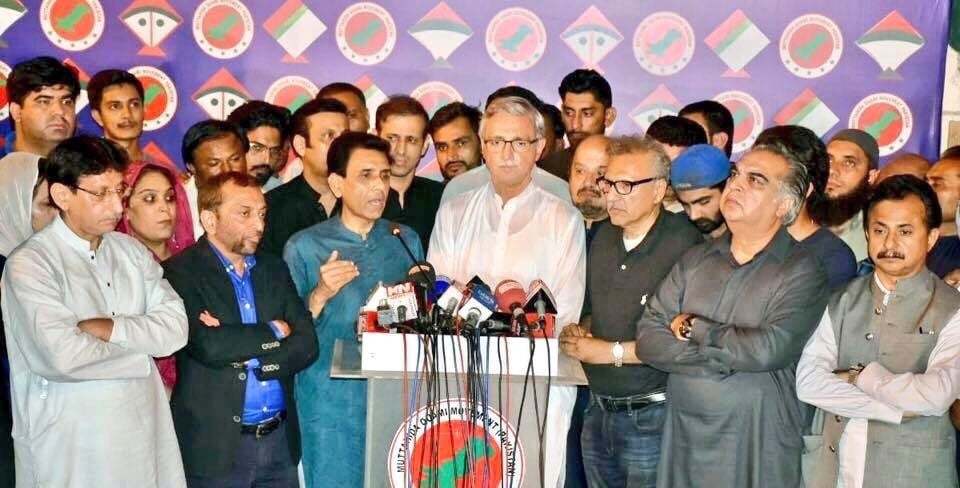
The PTI will mount pressure on PPP’s Sindh government to empower the local government

Political pundits had already predicted that results of the July 25 general polls would be interesting and unexpected because of security operation, delimitation on the basis of preliminary statistics of last year’s census and inner crisis in the Muttahida Qaumi Movement.
And so the Pakistan Tehreek-e-Insaf has emerged as the largest political party in Karachi by winning most of the city’s National and Sindh Assembly seats, snatching it from the MQM, which ruled the city for more than thirty years.
Political analysts believe that setbacks for other parties, such as the split in the MQM causing confusion among its workers and supporters, the emergence of the Tehreek-e-Labbaik Pakistan spoiling the MQM’s lower-income vote bank, the Pakistan People’s Party’s indifference towards the city, combined with voters turning their back on the Jamaat-e-Islami helped Imran Khan’s party to win the general polls from Karachi. The PTI also mustered support from non-traditional middle-class voters.
The PTI faces a great challenge: how to resolve Karachi’s civic issues, the glaring among them are scarcity of drinking water, heaps of garbage, broken roads, choked sewerage lines, traffic jams, lack of public transport, air pollution and load-shedding.
Over the last decade or so the PPP has been ruling Sindh and the MQM has represented the metropolis in the national and provincial assemblies as well as its local bodies. Due largely to the neglect and mismanagement of lawmakers belonging to both these parties, problems in the city have worsened in the past ten years.
The PTI Karachi issued a ‘plan of action’ for resolving the city’s water, garbage and electricity woes, weeks before the general elections, which was appreciated by the residents. Although the party is not able to form government in Sindh, a PTI provincial lawmaker elected from Karachi said, "We will take help from the federal government for solving civic issues in Karachi. Karachi is very important for the party as the awaiting-prime minister has also won from the city."
Most of the PTI’s elected parliamentarians from Karachi TNS talked to have signalled that the party will mount pressure on the PPP’s Sindh government to empower the local government. The MQM-P had won the local government polls -- mayor and chairman of three districts belonged to it, but because of legislation in Sindh Assembly carried out by the PPP, the elected representatives have become toothless. About half of Karachi Municipal Corporation’s municipal functions and powers have been taken by the provincial government.
The elected KMC’s city council has no powers in areas and functions falling under the jurisdiction of Sindh Building Control Authority, Master Plan Department, Karachi Water and Sewerage Board, Sindh Solid Waste Management Board, Lyari Development Authority, Malir Development Authority and Karachi Development Authority.
"The PTI has many plans for the city which will definitely worsen PPP-PTI relations as PPP would never want to empower local government," says Oonib Azam, a journalist who covers the city’s civic issues extensively.
Analysts believe that Karachi’s mismanaged urbanisation over the last thirty years is partly a result of the conflict between the PPP and the MQM. "With the MQM no longer in a powerful position after this election, the new political landscape could certainly prove beneficial for the city," says Mashail Malik, a PhD candidate at Stanford University, researching on ethnic politics in the city.
"In the past, we saw the federal government under Musharraf provide both funding and devolving power to local actors (the JI under the mayorship of Naimatullah Khan, and the MQM under the mayorship of Mustafa Kamal)."
She believes that most residents of Karachi would say this was a relatively prosperous period for the city, especially in terms of infrastructure projects. "The difference now is that the PTI at the centre is constrained by the 18th Amendment, so the Sindh government’s willingness to amend the Sindh Local Government Ordinance will matter. Despite this, the PTI could use several federal packages to improve the city’s basic transport, infrastructure and water provision problems," Malik tells TNS.
With only six seats, four from Karachi and two from Hyderabad in the National Assembly, PTI, which lacks a simple majority in the lower house has approached the MQM-P to forge a coalition in the centre.
"We met the PTI leadership and are ready to support the PTI in forming the federal government but we wanted a package for Karachi and Hyderabad and powers for local bodies in the two cities, along with other demands," says an MQM-P leader who doesn’t want to be identified.
"Ultimately, however, voters cannot hold their elected leaders accountable unless the province settles on a workable and long-lasting division of powers between the provincial and local governments," says Malik.
Azam sees PTI’s alliance with the MQM-P as empowering, "The PTI can give PPP a tough time and implement its Karachi plan of action. PTI’s plan for the city seems promising and it would be good if they engage the local government in it. In the past, we saw how federal government mismanaged the construction of Bus Rapid Transit (BRT). The PTI may not do that," says Azam.